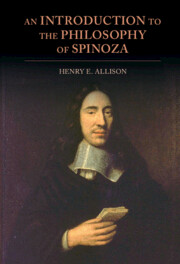Book contents
- An Introduction to the Philosophy of Spinoza
- An Introduction to the Philosophy of Spinoza
- Copyright page
- Contents
- Preface
- Acknowledgments
- Note on the Text
- Abbreviations
- Chapter 1 The Life of Spinoza
- Chapter 2 Spinoza’s Philosophy in Its Historical Context
- Chapter 3 God
- Chapter 4 The Human Mind
- Chapter 5 The Human Emotions
- Chapter 6 Spinoza’s Virtue Ethic
- Chapter 7 Freedom and Blessedness
- Chapter 8 The Individual and the State
- Chapter 9 The Theology of the Theological-Political Treatise
- Bibliography
- Index
Chapter 7 - Freedom and Blessedness
Published online by Cambridge University Press: 24 February 2022
- An Introduction to the Philosophy of Spinoza
- An Introduction to the Philosophy of Spinoza
- Copyright page
- Contents
- Preface
- Acknowledgments
- Note on the Text
- Abbreviations
- Chapter 1 The Life of Spinoza
- Chapter 2 Spinoza’s Philosophy in Its Historical Context
- Chapter 3 God
- Chapter 4 The Human Mind
- Chapter 5 The Human Emotions
- Chapter 6 Spinoza’s Virtue Ethic
- Chapter 7 Freedom and Blessedness
- Chapter 8 The Individual and the State
- Chapter 9 The Theology of the Theological-Political Treatise
- Bibliography
- Index
Summary
The fifth and final part of the Ethics is entitled “On the Power of the Intellect, or on Human Freedom.” The title reflects Spinoza’s relativized conception of human freedom, understood as control of the passions by the intellect. As the title suggests, it is intended to complement the fourth part, the full title of which is “On Human Bondage, or the Powers of the Affects.” Like E4, E5 is divided into two radically distinct parts, only the first of which is indicated by the title. The first part (E5p1–p20) provides an account of how and the extent to which human reason is able to control the passions and achieve the kind of freedom of which human beings are capable, insofar as they live according to the guidance of reason, which I have characterized as autocracy, while the second part (E5p21–p40) is concerned with the state of blessedness or beatitude (beatitudo), which, as the term suggests, is for Spinoza at once the condition of victory in the struggle with the passions and his rationalistic-naturalistic counterpart to the traditional religious conception of blessedness.
- Type
- Chapter
- Information
- An Introduction to the Philosophy of Spinoza , pp. 182 - 202Publisher: Cambridge University PressPrint publication year: 2022

